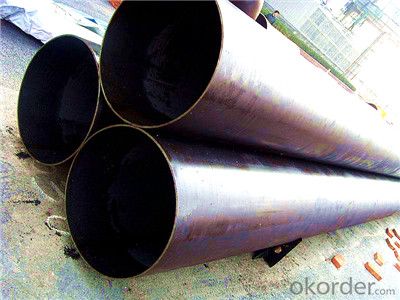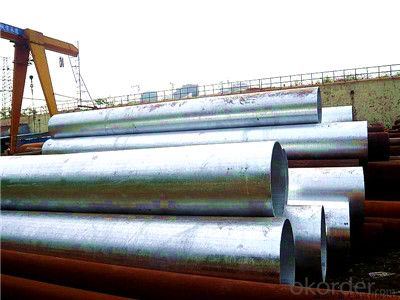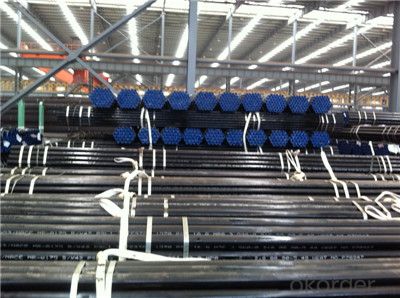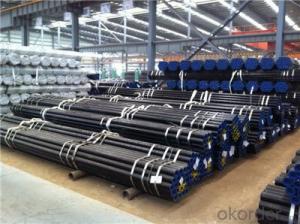CNBM seamless steel pipe with high quality
- Loading Port:
- Tianjin
- Payment Terms:
- TT OR LC
- Min Order Qty:
- 50 m
- Supply Capability:
- 200000 m/month
OKorder Service Pledge
OKorder Financial Service
You Might Also Like
PRODUCT DETAILS
1.Structure of Seamless Steel Pipe Description:
A large amount of Seamless Steel Pipes is offered to the clients at cost effective rates. These pipes are extremely durable, resistant to corrosion and have high tensile strength. Our pipes are used in nuclear plants, power plants, refineries and construction industry across the country. Furthermore, we are capable of providing these seamless pipes to the clients in bulk quantity.
2.Main Features of the Steel Pipe:
• High manufacturing accuracy
• High strength
• Small inertia resistance
• Strong heat dissipation ability
• Good visual effect
•Reasonable price
3.Packaging & Delivery:
| Packaging Details: | Seaworthy packages, bundles wrapped with strong steel strip |
| Delivery Detail: | 15-30 days after received 30% TT |
4.Seamless Steel Pipe Specification:
| Standard: | GB, DIN, ASTM,ASME, ASTM A106-2006, ASTM A53-2007 |
| Grade: | 10#,20#, 45#, 16Mn |
Thickness: | 8 - 33 mm |
| Section Shape: | Round |
| Outer Diameter: | 133 - 219 mm |
| Place of Origin: | Shandong, China (Mainland) |
| Secondary Or Not: | Non-secondary |
| Application: | Hydraulic Pipe |
| Technique: | Cold Drawn |
| Certification: | API |
| Surface Treatment: | factory state or painted black |
| Special Pipe: | API Pipe |
| Alloy Or Not: | Non-alloy |
| Length: | 5-12M |
| Outer Diameter: | 21.3-610mm |
5.Product pictures



5.FAQ of Seamless steel pipe:
①How is the quality of your products?
Our products are manufactured strictly according to national and internaional standard, and we take a test
on every pipe before delivered out. If you want see our quality certifications and all kinds of testing report, please just ask us for it.
Guaranteed: If products’ quality don’t accord to discription as we give or the promise before you place order, we promise 100% refund.
②How about price?
Yes, we are factory and be able to give you lowest price below market one, and we have a policy that “ for saving time and absolutely honest business attitude, we quote as lowest as possible for any customer, and discount can be given according to quantity”,if you like bargain and factory price is not low enough as you think, just don’t waste your time.Please trust the quotation we would give you, it is professional one.
③Why should you chose us?
Chose happens because of quality, then price, We can give you both.Additionally, we can also offer professional products inquiry, products knowledge train(for agents), smooth goods delivery, exellent customer solution proposals.Our service formula: good quality+good price+good service=customer’s trust.
SGS test is available, customer inspection before shipping is welcome, third party inspection is no problem.
Any question, pls feel free to contact us !
- Q:Are steel pipes suitable for underground irrigation systems?
- Yes, steel pipes can be suitable for underground irrigation systems. Steel pipes are known for their durability and strength, making them resistant to corrosion and able to withstand high pressure. They are also less likely to crack or break under the ground's weight or pressure. Additionally, steel pipes have a long lifespan, reducing the need for frequent replacements. However, it is important to consider the type of water being transported, as certain minerals or chemicals in the water can cause corrosion over time. In such cases, it may be necessary to use corrosion-resistant coatings or liners. Overall, steel pipes are a reliable choice for underground irrigation systems, especially in areas with high water pressure or where durability is a priority.
- Q:How are steel pipes cleaned and flushed?
- Steel pipes are cleaned and flushed using a variety of methods. One common method is high-pressure water jetting, where water is forcefully sprayed through the pipes to remove debris and sediments. Chemical cleaning agents are also used to dissolve any stubborn deposits. Additionally, mechanical methods such as using wire brushes or pigs (devices inserted into the pipes to scrape the interior) can be employed to remove any remaining buildup. Regular maintenance and inspection are crucial to ensure the cleanliness and efficiency of steel pipes.
- Q:What is the difference between steel pipes and cast iron pipes?
- The main difference between steel pipes and cast iron pipes lies in their composition and properties. Steel pipes are made from an alloy of iron and carbon, which gives them high strength and durability. They are also resistant to corrosion and can withstand high pressure and temperature conditions. On the other hand, cast iron pipes are made from molten iron, which provides them with excellent soundproofing capabilities and resistance to fire. However, cast iron pipes are more prone to corrosion and can be brittle, making them less suitable for high-pressure applications.
- Q:Can steel pipes be used for underground drainage?
- Yes, steel pipes can be used for underground drainage. Steel pipes are commonly used in underground drainage systems due to their durability, strength, and resistance to various environmental factors. They are able to withstand heavy loads, pressures, and corrosion, making them suitable for long-term underground drainage applications.
- Q:What are the uses of seamless steel tubes?
- Compared withsteel and roundsteelinsolid, flexural torsional strength in the same time, the weight is light, is a kind of economic section steel, widely used in the manufacture of structural parts and mechanical parts, such as the oil pipe, automobile transmission shaft, the bicycle frame and steel construction with scaffold with steel pipe manufacturing ring parts can be improved the utilization rate of materials, simplify the manufacturing process, material saving and working hours, such as rolling bearing ring, Jack and so on, has been widely used in steel pipe manufacturing.
- Q:Can steel pipes be used for wastewater disposal?
- Yes, steel pipes can be used for wastewater disposal. Steel is a durable and corrosion-resistant material, making it suitable for transporting and disposing of wastewater safely and efficiently.
- Q:What are the different grades of steel used in manufacturing pipes?
- The different grades of steel used in manufacturing pipes are typically categorized based on their chemical composition and mechanical properties. Some common grades include carbon steel, stainless steel, alloy steel, and duplex steel. Each grade has its own unique characteristics and is chosen based on the specific requirements of the application, such as corrosion resistance, strength, and temperature resistance.
- Q:What is the cost of steel pipes compared to other pipe materials?
- The cost of steel pipes is typically higher compared to other pipe materials such as PVC or copper.
- Q:What are the non-destructive testing methods used for steel pipes?
- Some of the non-destructive testing methods used for steel pipes include ultrasonic testing, magnetic particle testing, liquid penetrant testing, radiographic testing, and eddy current testing.
- Q:What is the difference between steel pipes and FRP pipes?
- Steel pipes and FRP pipes are commonly used in various industries and applications, but they differ in several ways: 1. Material Composition: Steel pipes are constructed from iron and carbon alloys, along with elements like manganese, silicon, and small amounts of other metals. Conversely, FRP pipes consist of a polymer matrix reinforced with fibers such as glass or carbon. 2. Strength and Durability: Steel pipes are renowned for their exceptional strength and durability, enabling them to endure high pressures, heavy loads, and extreme temperatures. Although FRP pipes are also strong and durable, they are comparatively lighter in weight and may not possess the same level of strength as steel pipes. Nonetheless, they excel in corrosion resistance and have a longer lifespan in corrosive environments. 3. Corrosion Resistance: Steel pipes are susceptible to corrosion and thus require protective coatings or linings to prevent rust and deterioration. In contrast, FRP pipes possess inherent corrosion resistance and do not necessitate additional coatings. Consequently, they are well-suited for transporting corrosive fluids or functioning in corrosive environments. 4. Installation and Maintenance: Installing steel pipes necessitates specialized welding or threading techniques. Consequently, installation can be more labor-intensive and time-consuming, particularly for complex or large-scale projects. Conversely, FRP pipes are lightweight and easily transportable and installed. Often arriving in pre-fabricated sections, they expedite installation, reduce labor requirements, and demand minimal maintenance in comparison to steel pipes. 5. Cost: Generally, steel pipes are more expensive than FRP pipes due to the higher cost of raw materials and the need for additional corrosion protection measures. FRP pipes offer a cost-effective alternative, particularly in applications where corrosion resistance is paramount, as they eliminate the necessity for expensive coatings or linings. Ultimately, the selection between steel pipes and FRP pipes depends on the specific requirements of the application. Steel pipes are favored for their high strength, whereas FRP pipes offer advantages such as corrosion resistance, lightweight construction, and cost-effectiveness.
1. Manufacturer Overview |
|
|---|---|
| Location | |
| Year Established | |
| Annual Output Value | |
| Main Markets | |
| Company Certifications | |
2. Manufacturer Certificates |
|
|---|---|
| a) Certification Name | |
| Range | |
| Reference | |
| Validity Period | |
3. Manufacturer Capability |
|
|---|---|
| a)Trade Capacity | |
| Nearest Port | |
| Export Percentage | |
| No.of Employees in Trade Department | |
| Language Spoken: | |
| b)Factory Information | |
| Factory Size: | |
| No. of Production Lines | |
| Contract Manufacturing | |
| Product Price Range | |
Send your message to us
CNBM seamless steel pipe with high quality
- Loading Port:
- Tianjin
- Payment Terms:
- TT OR LC
- Min Order Qty:
- 50 m
- Supply Capability:
- 200000 m/month
OKorder Service Pledge
OKorder Financial Service
Similar products
New products
Hot products
Related keywords































